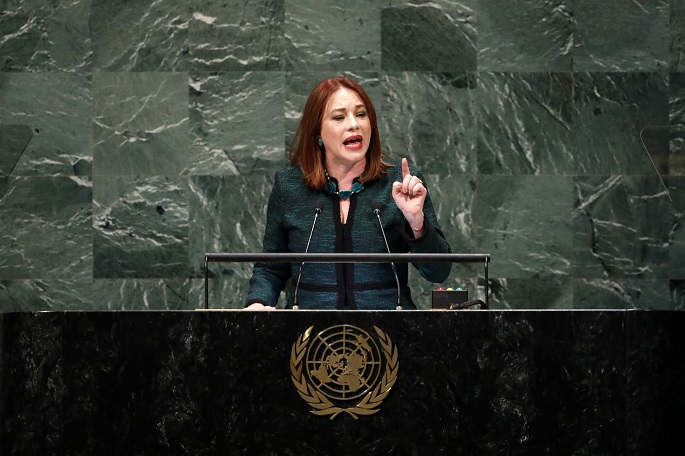UNGA adopts political declaration on non-communicable diseases
Published : 28 Sep 2018, 11:45
The UN General Assembly approved a draft political declaration re-affirming the need to reduce deaths by non-communicable diseases (NCDs) by one third by 2030.
The document included commitments to reducing by one third premature mortality from NCDs by 2030, in line with the 2030 Agenda for Sustainable Development of the UN.
While acknowledging the progress achieved by some countries in controlling four major NCDs -- cardiovascular disease, diabetes, cancer and chronic respiratory diseases, the text said efforts to reach the commitments has been inadequate.
The text, entitled "Time to Deliver: Accelerating our response to address NCDs for the health and well-being of present and future generations," was adopted at the General Assembly's third High-Level Meeting on Prevention and Control of NCDs.
While hailing it as "ambitious and balanced," UN General Assembly President Maria Fernanda Espinosa Garces called to attention that a huge number of people between the ages of 30 and 70 will die in 2018 because of NCDs.
The poorest will likely suffer most from illnesses such as cancer, diabetes and cardiovascular disease, which more broadly lead to annual GDP losses of up to 6 percent, she added.
UN Secretary-General Antonio Guterres noted in his remarks, delivered by his deputy Amina Mohammed, that NCDs are responsible for some 70 percent of deaths globally.
The UN chief went on to elaborate on the economic, environmental, social aspects of the NCDs.
"The costs of NCDs are enormous -- not only to the people affected, but also to national budgets, health systems, and the global economy," according to his speech.
Also, climate change and air pollution increase the risk of NCDs, he pointed out.
Air pollution causes a quarter of adult deaths from both heart disease and stroke, while it is responsible for some 30 percent of deaths due to lung cancer, his remarks cited the World Health Organization as saying. "The result is an alarming loss of 7 million lives prematurely each year to polluted air."
The secretary-general also pointed to the need to address long-neglected mental health.
"One-in-four of us will experience a mental health episode at some point in our life," he said. "One-in-five of adolescents experience a mental health disorder in any given year."
The political declaration also recognized mental health conditions, as well as neurological disorders, contribute to the global burden of NCDs.
Moreover, alcohol and drug use deserves greater attention, Guterres continued, detailing more than 3 million people die every year from the harmful use of alcohol, and almost half a million because of drug abuse.
Furthermore, the world is facing a double burden of under- and over-nutrition, with some 810 million people undernourished with obesity skyrocketing at the same time.
Concluding these remarks, Guterres urged member states to ensure that NCDs "are embedded in the greater health and development agenda, including strengthening health systems and moving towards universal health coverage."
WHO Director-General Tedros Adhanom Ghebreyesus highlighted the challenges the world faces in meeting the UN target set out both in the 2030 Agenda and the declaration.
He warned "we are dangerously off course (for reducing by one-third pre-mature mortality from NCDs by 2030)," predicting "at the current pace, less than half of the world's countries will meet that target."
However, he said "we can change course," adding "we could prevent 10 million of these deaths by 2025."
Ghebreyesus was referring to WHO's "Best Buys," a set of 16 practical interventions that are "cost-effective and feasible for all countries including low- and middle-income countries."
Its list includes tobacco control measures, vaccination campaigns, and the production of food that contains less sugar, salt and fat.
Stressing that the "benefits go beyond health," he noted that "every dollar invested in the Best Buys, will yield a return of at least seven dollars."
He proposed the creation of a "coalition of champions" that would spearhead a three-to-five-year commitment for the quick and intense implementation of the WHO interventions, and showcase their potential impact.
In his remarks, Ghebreyesus outlined a number of NCDs and asked delegates to stand up when they heard the disease that had killed someone they loved. "Heart disease, stroke, cancer, diabetes, chronic Lyme disease, depression..."
As the list went on, one by one, every single person in the room got to their feet.
Every year, 41 million people are killed prematurely by preventable NCDs, which Ghebreyesus declared a "needless suffering, expense and death." The figure represents 70 percent of all deaths globally.
What's more, NCDs affect mostly the poor. Of that 41 million total, 85 percent are in developing countries.
Closing his remarks, the head of WHO said that three key things are needed in every country to win the "fight against NCDs" and achieve the UN 2030 target: political commitment, domestic investment and universal health coverage.
Thursday's meeting is the Assembly's third on the issue since its landmark 2011 summit and 2014 review, with the draft declaration to be sent to the Assembly plenary for adoption at a later date.


